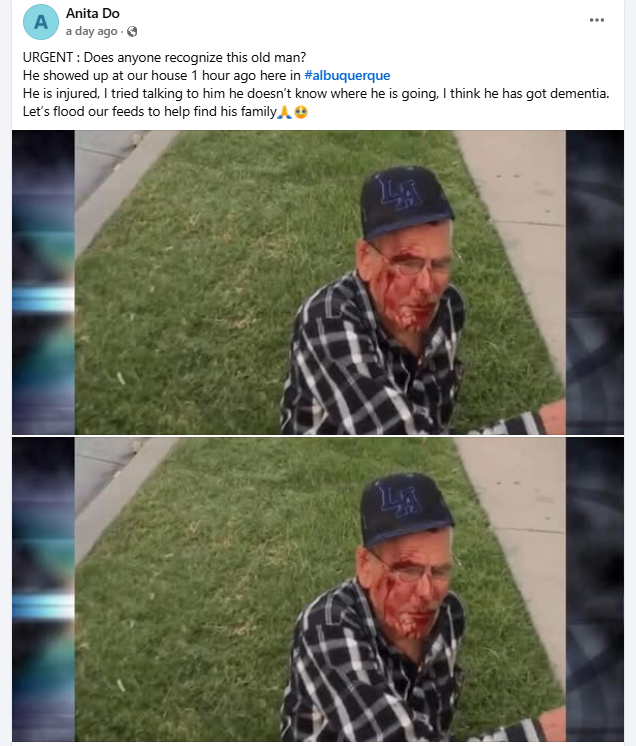STORY UPDATED: check for updates below.

Are social media posts about an "injured" man with dementia who showed up at someone's house real? No, that's not true: Photographs included in the post show a man who was attacked in 2018 in Los Angeles. Several posts falsely claimed the man in the photographs was found in states including Georgia, New Mexico, Washington and California. These posts are part of what's known as a "bait and switch" scam to trick people into sharing a post that will be later edited to show real estate listing scams or other offers used to lure users into giving their personal information.
The claim appeared in a post (archived here) on Facebook on December 8, 2024. It opened:
URGENT : Does anyone recognize this old man?
He showed up at our house 1 hour ago here in #albuquerque
He is injured, I tried talking to him he doesn't know where he is going, I think he has got dementia.
Let's flood our feeds to help find his family
This is what the post looked like on Facebook at the time of writing:
(Source: Facebook screenshot taken on Mon Dec 9 19:21:55 2024 UTC)
Another post (archived here) claimed he was found in Beaumont, Texas, before being edited. It read:
The distinctive wording of both posts is identical; only the location is changed.
The edit history of any post can be seen by clicking on the three-dot menu in the upper right hand corner of the post. This shows that the original post was edited to remove two photos and add another four. This is what the edit history of the post looked like at the time of writing:
(Source: Facebook screenshot taken on Mon Dec 9 19:57:43 2024 UTC)
This is what the post looked like after being switched to a real estate ad:
(Source: Facebook screenshot taken on Mon Dec 9 19:57:53 2024 UTC)
Several other posts claimed the same man was found in Gainesville, Georgia, Hesperia, California, Yakima, Washington, and other locations using the same picture and format:
(Source: Facebook screenshots taken on Mon Dec 9 2024 UTC)
Attack Victim
A reverse image search using Google Lens (archived here) revealed that the man shown in the posts on Facebook was identified as Rodolfo Rodriguez. According to the Sacramento Bee (archived here), Rodriguez was the victim of a 2018 attack in Los Angeles.
Lead Stories fact checked a similar claim about a supposed missing woman with dementia in July 2024, where the posts' format was nearly identical to the supposed missing man with dementia.
Real estate scam posts
In a previous fact check on a similar bait-and-switch claim, published on May 9, 2024, Lead Stories defined real estate scam posts:
Real estate scam posts are a tactic used on Facebook by spammers that employ bait-and-switch content to lure people into a scam. A post's creator will pair an alarming or heart-wrenching claim with a compelling image to catch people's attention -- missing children or aging adults, injured animals, injured people in hospital beds, and sex trafficking tactics -- and drive engagement.
Once a post has garnered sufficient attention, the content switches to push a deceptive real estate advertisement. The wording and images of these eye-catching posts, typically seen on local Facebook "yard sale" pages, are frequently identical, even when the offered property is located in different cities, regions of the U.S. or countries.
The content switch is documented by a post's edit history, which also notes additions or deletions of content. Sometimes, time stamps on the posts indicate when the switches were made, but timestamps don't change on some posts even though the content does.
Commonly, such posts use links that lead to landing pages with disclaimers or false promises and contact information requests that can be used to gather personal data, including financial information, from people who follow the trails.
Some links purport to connect people to a U.S. Housing and Urban Development site to help them search for deals on foreclosed homes. Lead Stories found that the links lead to new sites with disclosures at the bottom of the page that note they are "not affiliated with, endorsed, authorized, or approved by the Federal Government or the US Department of Housing and Urban Development.
No turkey
The too-good-to-be-true offer is a common strategy employed by scammers to steal personal information. Another instance of this bait-and-switch ad (archived here) was a post that began with the false search plea for the injured man, then switched to a supposed free turkey. It read:
(Source: Facebook screenshot taken on Tue Dec 10 16:18:02 2024 UTC)
The link in the post directed to meatbox-turkey.godaddysites.com. Clicking through then directed to another website that, instead of the free turkey. asked for personal information including gender, first and last name, email and birth date. Different offers were presented, ultimately all asking for personal information in exchange for too-good-to-be-true offers after filling short surveys. The fine print read "Shown brands are not associated with the organisers of this competition."
This is what that website looked like:
(Source: ca.12xlwin8.net screenshot taken on Tue Dec 10 16:35:12 2024 UTC)
Read More
Other Lead Stories fact checks about bait and switch scams can be found here.
Updates:
-
2024-12-10T01:14:11Z 2024-12-10T01:14:11Z Updated to incorporate other forms of the "Old Man" scam that entice others into providing their personal information.






















